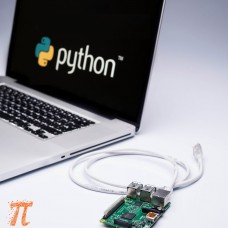Introduction to Python Coding on Raspberry Pi and Linux
This is an introduction to programming in Python on the Raspberry Pi platform. It offers the beginner to intermediate candidate on how to get started and write practical code using Python on the Raspberry Pi. Focus here shifts to and introduction to development in Python language on the Raspberry Pi, including basics, coding and development for network enabled application and also GPIO pin programming for the Raspberry Pi to start interfacing with electronics.
Included in the course:
- A printed course manual
- A Raspbian Micro SD card prepopulated with some examples and code for our training session
- A light lunch
You need:
- Mac/Laptop with an Ethernet networking interface
- A Raspberry Pi 2/3 (Don't have one? Add a Raspberry Pi and optionally a power supply and case to your cart above!)
Course Layout
- Essence Of the Pi and this Guide
- Setting up your Raspberry Pi and getting connected
- Introduction the Python and why Python
- Python Language Reference
- Assigning Variables and Adding Comments
- Understanding Lists
- Debugging, String and File Handling
- Writing your first few practical Python scripts
- Developing a network enabled program using Python
- Interface with the outside world using Python and basic electronics (GPIO)
Upon completion of this training course, it is expected that participants will be able to:
- Describe features of Raspberry Pi hardware.
- Set up and configure a Raspberry Pi.
- Understand how to connect to your Raspberry Pi.
- Understand basic Linux and command line utilities available
- Able to develop a program using Python programming language
- Able to develop a network enabled client/server program using Python programming language
- Communicate with the real physical world through some basic GPIO Python programming
Requirements
Bring your Mac/laptop – it needs to have an Ethernet port and ideally 4GB of RAM – we use the Ethernet port to communicate with the PI.
Bring your own Raspberry PI, model B, 2 or 3. Raspberry PI A and zero not supported – needs a Ethernet connection.
Don't have a Raspberry Pi? We also provide the option to supply you with a Raspberry Pi 3 Model B, select the additional option during your online course booking. You could potentially also source a Raspberry Pi from stores such as PiShop or RS Electronics – go for the Raspberry PI 3, if you are not sure.
Date
Saturday, To Be Announced
Time
09h00 to 15h00
Venue
This training course for the above date will be held at the Randburg training venue.
Address: Obsidian Systems, Unit 5, 2 Ateljee St, Randpark Ridge, Randburg, 2169, South Africa
Tags: Introduction to Python Coding on Raspberry Pi and Linux





